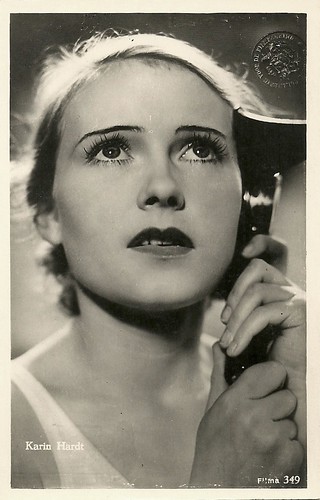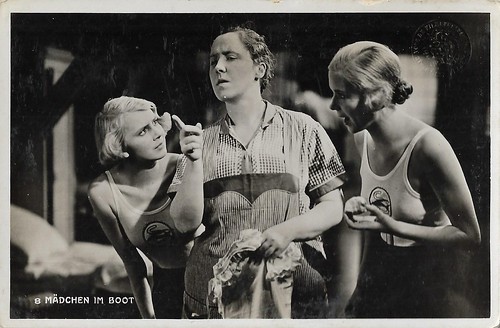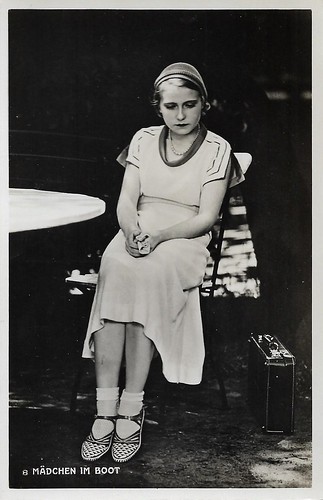
Dutch postcard by JosPe, Arnhem, no. 349. Photo: Filma. Karin Hardt in Acht Mädels im Boot/Eight Girls in a Boat (Erich Waschneck, 1932). Dutch censorship mark at the right.

Dutch postcard by JosPe, Arnhem. Photo: Filma. Karin Hardt in Acht Mädels im Boot/Eight Girls in a Boat (Erich Waschneck, 1932).

Dutch postcard by JosPe, Arnhem. Karin Hardt in Acht Mädels im Boot/Eight Girls in a Boat (Erich Waschneck, 1932).
Girls sticking close together
Acht Mädels im Boot/Eight Girls in a Boat (1932) is a German musical film directed by Erich Waschneck and starring Karin Hardt, Theodor Loos, and Helmuth Kionka. Also in the cast were the young and upcoming actresses Ali Ghito and Sabine Peters. The film's sets were designed by art director Alfred Junge.
Franz Winterstein wrote the script for Acht Mädels im Boot/Eight Girls in a Boat (1932). Erich Waschneck directed the film in 1932 with members of the Berlin women's rowing club Seeschwalben.
The eight young girls of the title stick close together as a rowing team. On the outskirts of Berlin, the girls train with their strict coach Hanna (Ali Ghito) for the annual regatta. One of them, Christa Storm, an 18-year-old schoolgirl (Karin Hardt), suddenly behaves strangely. Her performance in sports is declining, and at school, she fails her A-levels.
Christa who is engaged to chemistry student Hans Hellbach (Helmuth Kionka), realises that she is pregnant but dares not confide in anyone that she is having a baby. When she confesses to Hans that she is expecting a baby and wants to marry him, the young man turns out to be unenthusiastic because he is afraid of his father. He urges her to have an abortion but Christa is not quite up to it.
Christa, disappointed and angry, decides to fend for herself. A doctor friend also tries to persuade her to abort, but she refuses to have the procedure done and runs away. Fearing her father (Theodor Loos), she is desperate.
Christa flees to her sports mates in the rowing club Seeschwalben (Terns). Christa breaks down in training and finally confesses to Hanna that she is expecting a child. When the girls learn the truth about their comrade, Christa finds support from her friends. With their help, she succeeds in persuading her father and boyfriend to change their minds. Everything turns out fine: her father takes her back in and allows her to give birth to the child. And the eight girls will stay together as good comrades.

Dutch postcard (with Dutch censorship mark on the right) by Jospe, Arnhem. In the middle, Edna Gray (Edna Kraus-Dumke) in Acht Mädels im Boot/Eight Girls in a Boat (Erich Waschneck, 1932), presented here as 8 Mädchen im Boot.

Dutch postcard by Jospe, Arnhem. Karin Hardt (Christa) in Acht Mädels im Boot/Eight Girls in a Boat (Erich Waschneck, 1932), presented here as 8 Mädchen im Boot. The Dutch title was 8 Meisjes in een boot.

Dutch postcard by Jospé, Arnhem. Theodor Loos (Baumeister Engelhardt) and Karin Hardt (Christa) in Acht Mädels im Boot/Eight Girls in a Boat (Erich Waschneck, 1932), presented here as 8 Mädchen im Boot.
A pure and natural girl
Acht Mädels im Boot/Eight Girls in a Boat (Erich Waschneck, 1932) won the gold medal at the Venice Film Festival. The film has been compared to films like Kuhle Wampe/To Whom Does the World Belong? (Slatan Dudow, 1932) and Mädchen in Uniform/Girls in Uniform (Leontine Sagan, 1931), both with Hertha Thiele who like Karin Hardt, was known for her roles as a pure and natural girl.
Mädchen in Uniform (1931) with Dorothea Wieck and Hertha Thiele had been a success throughout much of Europe and was followed by other German films about intimate relationships among women, including Acht Mädels im Boot/Eight Girls in a Boat (1932). Others were Anna and Elizabeth (1933), which also starred Wieck and Thiele and Ich für dich, du für mich/Me for You, You for Me (1934). Both films were banned by the Nazis.
Acht Mädels im Boot/Eight Girls in a Boat (Erich Waschneck, 1932) has been remade twice. The first remake was the American film Eight Girls in a Boat (Richard Wallace, 1934) with Dorothy Wilson, Douglass Montgomery, Kay Johnson and Walter Connolly.
The second remake was the Dutch film Jenny (Willy van Hemert, 1958) starring his daughter Ellen van Hemert, Maxim Hamel and Kees Brusse. There was also a German-language version, Acht Mädels im Boot/Eight Girls in a Boat (Alfred Bittins, 1958) with Heli Finkenzeller, Gisela Fritsch and Maxim Hamel. Neither remake was a musical.

German postcard by Ross Verlag, no. 7047/1, 1932-1933. Photo: Fanal-Terra Produktion. Karin Hardt in Acht Mädels im Boot/Eight Girls in a Boat (Erich Waschneck, 1932).

Dutch postcard by M. Bonnist & Zonen, Amsterdam, no. 146. Photo: Filma, Amsterdam. Karin Hardt in Acht Mädels im Boot/Eight Girls in a Boat (Erich Waschneck, 1932).

Dutch postcard by M. Bonnist & Zonen, Amsterdam. Photo: Filma, Amsterdam. Karin Hardt in Acht Mädels im Boot/Eight Girls in a Boat (Erich Waschneck, 1932).

German collectors card in the series 'Vom Werden deutscher Filmkunst - Der Tonfilm', album no. 11, picture no. 83. Photo: Fanal-Terra-Produktion / Ross Verlag. Karin Hardt in Acht Mädels im Boot/Eight Girls in a Boat (Erich Waschneck, 1932).
Sources: Filmportal.de (German), Wikipedia (German and English), and IMDb.
No comments:
Post a Comment